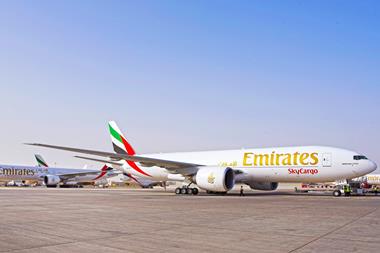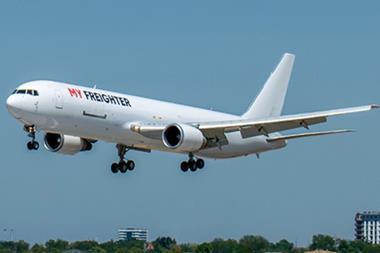Emirates SkyCargo has reported high demand for long-term contracts despite the current market uncertainties.
Speaking to Air Cargo News during Air Cargo Europe, Nabil Sultan, divisional senior vice president at Emirates SkyCargo, said that companies were looking to secure long-term capacity in order to avoid capacity shortages experienced over the last couple of years.
"It's a case of once bitten, twice shy," Sultan said, explaining that the carrier was booking a lot of long-term contracts for the coming six to eight months.
Vice president Europe and global sales Jeffrey Van Haeften added: "We have never seen such a number of requests for long-term capacity, long-term agreements, than we have seen in the last few months."
Van Haeften said that this was an indication that the market would rebound in the second half of the year after lower demand in the first four months.
Asked what was driving the demand, Sultan added: "There are a number of industries that are still lagging with a huge backlog in terms of getting the products out into the market. It is a question of how quickly you can ramp up and get these commodities out there and of course, speed is again going to be a major factor."
He added: "If you look at markets like the US and Europe, we really haven't seen yet a reduction in terms of buying power. If you look at industries like building materials, furniture, garments and fashion - it has not slowed down.
"This is despite the fact that there is a sentiment out there that there could be a recession looming, there could be a crunch on jobs but there is still quite a strong sentiment."
He added that China was quickly restarting production after last year's Covid lockdowns and this could help cater for backlogs for some commodities.
Sultan pointed to the waiting times in automotive to demonstrate how the backlogs in some industries were holding back consumer spending.
He also said that high interest rates favoured airfreight over ocean as speed to market became even more critical.
Van Haeften added that despite the slow start to the year, revenues remained strong and customers were also expecting an improvement.
"We are still quite positive about what is happening and for the next six months, we think that the market will come back again," he said.
"[The market] is always difficult to understand - what are the reasons behind customer behaviour, is there a recession coming, are elections involved in everything that we do?
"But right now, if you look at the market, and if you look at the customers that we talk to, they all expect that in the last six months, the market will rebound a little bit."
The two were speaking shortly after the carrier announced the addition of two Boeing 747-400Fs to its fleet and outlined plans to double freighter capacity over the coming decade.
The cargo division of Emirates is expecting 15 more freighters to join its fleet from announced orders and its freighter conversion programme, plus a boost in bellyhold capacity from new passenger aircraft deliveries starting with Airbus A350s in late summer 2024, followed by 777-Xs the year after.
Sultan said that decision was driven by an increasing need for faster supply chains as well as expectations of long-term demand growth.
He said that "a lot of work" has been carried out over the past two to three years to understand the medium- to long-term demand.
"If you look at logistics and supply chain as an industry, it has grown 3.5-4% on average annually and that sets the ground for us."
He added: "Airfreight will play a major role in transporting a lot of goods and commodities as time becomes an essential component of getting commodities to market very quickly.
"We see consumer behaviour changing substantially where a lot of the manufacturers are looking at ensuring new products are on the shelves on almost a weekly basis as opposed to different products every month."
He added that e-commerce demand had grown substantially during Covid and that has introduced a new revenue stream and commodity into the market.
Manufacturers are also adding distribution sites in Dubai where they can carry out packaging and labelling before pushing products out to final market.
"A lot of e-commerce platforms and big manufacturers are positioning their distribution centres in Dubai to take advantage of Emirates' network, capacity and the reach that we provide across the globe on a daily, double daily and even triple daily flying."
The carrier also last week announced the launch of two new bespoke services for the global healthcare industry.
Emirates Vital and Emirates Medical Devices will be available under the freight carrier’s rebranded Life Sciences and Healthcare product range, which also encompasses its pre-existing pharmaceutical transport offerings.
Sultan said that the launch of the new services reflected the ongoing segmentation of pharma industry.
Van Haeften added that there were an increasing number of regulations that meant more specialised solutions were required.
"The days of having just general verticals in any field are gone," said Sultan. "We are now aligning our products and solutions to a specific subsegment of those markets and working more closely with manufacturers to be able to provide the solution.
"You are almost embedding yourself with these organisations, with these manufacturers, to understand the strength of the product and what it would require in terms of temperature control, handling, security - being able to tailor make a solution that suits that commodity."
https://www.aircargonews.net/airlines/bellyhold-airline/emirates-skycargo-launches-new-pharma-services/















